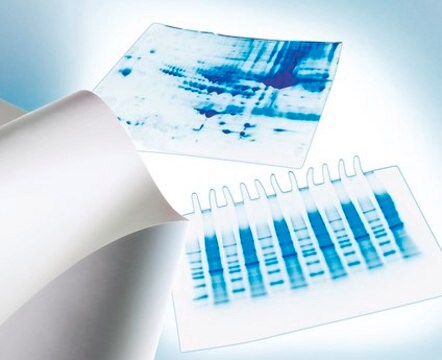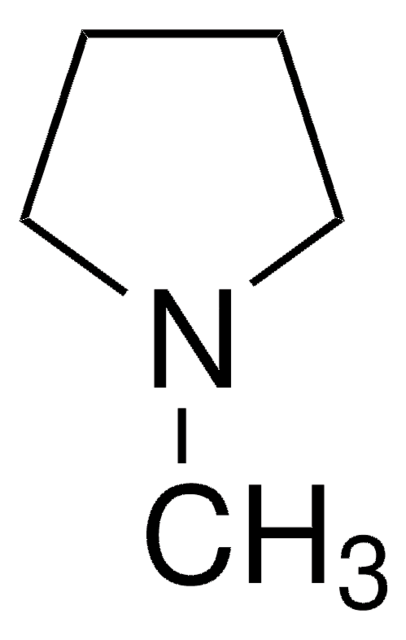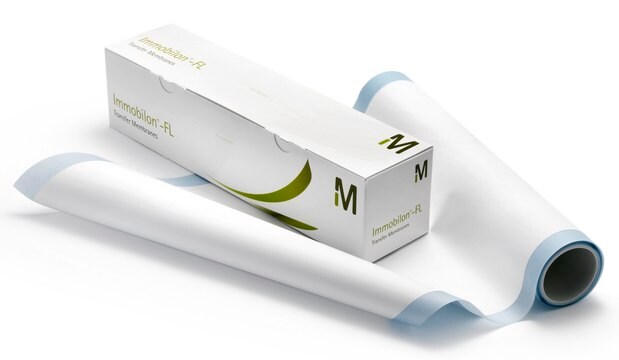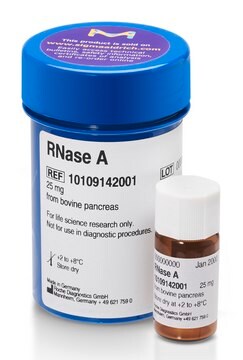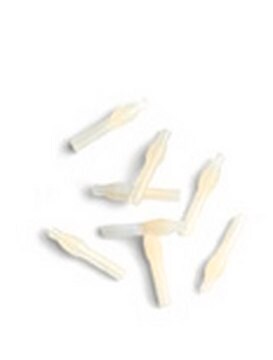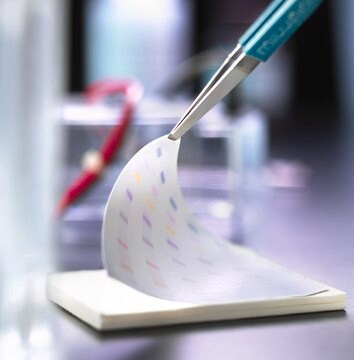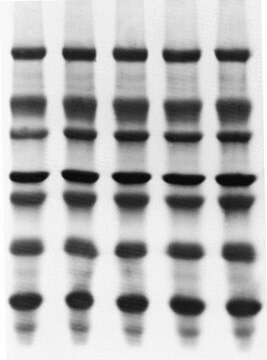P2938
Immobilon®-P Polyvinylidene difluoride membranes
size 26.5 cm × 375 cm
Synonim(y):
PVDF
Zaloguj sięWyświetlanie cen organizacyjnych i kontraktowych
About This Item
Kod UNSPSC:
41105339
NACRES:
NA.25
Polecane produkty
producent / nazwa handlowa
Millipore IPVH00010
rozmiar
26.5 cm × 375 cm
Szukasz podobnych produktów? Odwiedź Przewodnik dotyczący porównywania produktów
Zastosowanie
Immobilon-P Polyvinylidene difluoride membrane has been used in western blotting for the transfer of proteins after sodium dodecyl sulfate–polyacrylamide gel electrophoresis (SDS-PAGE).
Polyvinylidene difluoride membranes are popular membranes for immunoblotting (Western blotting), and sequencing of proteins. The basis of protein binding to PVDF is believed to be due to hydrophobic interactions. PVDF membranes for Western blotting are available in the most commonly used 0.45 μm pore size. PVDF membranes have a greater protein binding capacity, are more durable and more solvent resistant than nitrocellulose.
Informacje prawne
Immobilon is a registered trademark of Merck KGaA, Darmstadt, Germany
This page may contain text that has been machine translated.
Kod klasy składowania
11 - Combustible Solids
Klasa zagrożenia wodnego (WGK)
WGK 3
Temperatura zapłonu (°F)
Not applicable
Temperatura zapłonu (°C)
Not applicable
Środki ochrony indywidualnej
Eyeshields, Gloves, type N95 (US)
Certyfikaty analizy (CoA)
Poszukaj Certyfikaty analizy (CoA), wpisując numer partii/serii produktów. Numery serii i partii można znaleźć na etykiecie produktu po słowach „seria” lub „partia”.
Masz już ten produkt?
Dokumenty związane z niedawno zakupionymi produktami zostały zamieszczone w Bibliotece dokumentów.
Klienci oglądali również te produkty
Cross-phosphorylation between Arabidopsis thaliana sucrose nonfermenting 1-related protein kinase 1 (AtSnRK1) and its activating kinase (AtSnAK) determines their catalytic activities.
Crozet P, et al.
The Journal of Biological Chemistry, 285, 12071-12077 (2010)
Clare M Hamilton et al.
Infection and immunity, 77(6), 2488-2498 (2009-04-01)
Parasitic worms and molecules derived from them have powerful anti-inflammatory properties and are shown to have therapeutic effects on inflammatory diseases. The helminth Fasciola hepatica has been reported to suppress antigen-specific Th1 responses in concurrent bacterial infections, thus demonstrating its
Nasz zespół naukowców ma doświadczenie we wszystkich obszarach badań, w tym w naukach przyrodniczych, materiałoznawstwie, syntezie chemicznej, chromatografii, analityce i wielu innych dziedzinach.
Skontaktuj się z zespołem ds. pomocy technicznej